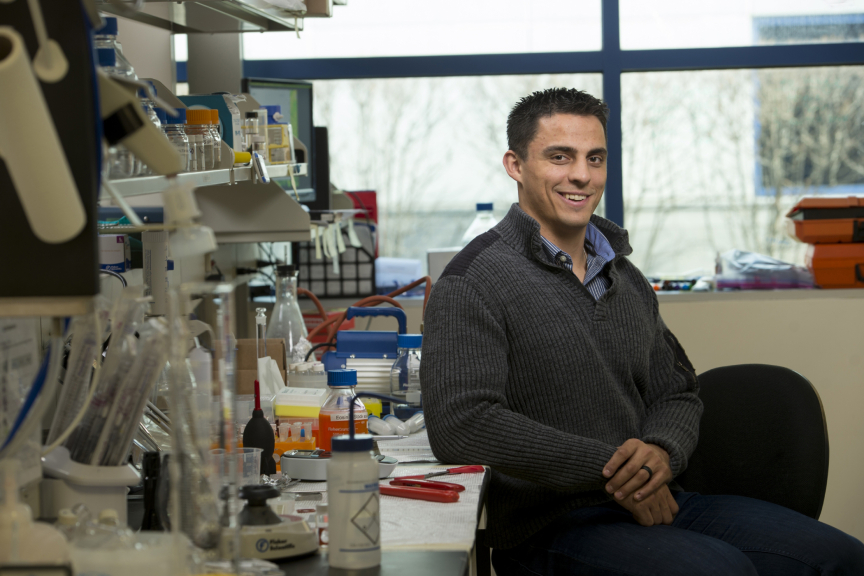Student-Run Biotech Helps Identify Diseases By Rendering Tissue ‘Transparent’
Michael Johnson, Co-founder of Visikol Inc., named to Forbes' ‘30 Under 30’ list for science

"I’m looking at the next decade as a time when this tool will be used to gather a tremendous amount of information that will improve the diagnostic capabilities of diseases"– Michael Johnson
Michael Johnson always knew what he wanted to do when he grew up. He had a passion for science and liked to build things before taking them apart to see why they worked. Or what happened when they didn’t.
“My dad was an eighth-grade science teacher and I remember taking everything apart in the house because I was always interested in seeing how the world works,” said Johnson, a Rutgers doctoral student who was recently named to the Forbes' “30 Under 30” list for science.
The 600 women and men selected to represent the country’s most important young entrepreneurs, creative leaders and industry stars in a number of fields, were chosen from an initial screening of more than 15,000 candidates.
Johnson, a 27-year-old scientist, was selected for his role in starting Visikol Inc., a student-run biotech company that allows scientists to view tissues in 3-D space as opposed to the traditional 2-D slices. The new scientific platform – which renders tissues transparent – will make it easier to identify cancers like prostate and breast in body tissue samples. It is being used by over 160 researchers in the United States and Europe.
“I’m looking at the next decade as a time when this tool will be used to gather a tremendous amount of information that will improve the diagnostic capabilities of diseases,” said Johnson, Visikol’s chief executive officer.
The discovery of the bio-imaging technique and the inspiration to take on the business venture got its start in a plant biology class at Rutgers. Tom Villani, another Rutgers doctoral student who would become the company’s chief scientific officer, was working with faculty advisers, including Jim Simon, a Rutgers distinguished professor of plant biology. The scientists were looking for a chemical agent that would allow for the microscopic visualization of plants that was safer and more accessible than traditionally used chloral hydrate, a highly regulated narcotic with a long history of abuse that is difficult to obtain.
Soon afterwards, these scientific entrepreneurs realized that the new formula they created was not limited to plant biology and could be used on a wide range of biological tissues. The formula turns whole organs like brains, hearts, lungs and kidneys transparent and provides researchers with the ability to study drug development and diseases in a way that was never possible.
Still, starting a biotech company from the ground up is not easy, and Johnson, who had taken graduate courses in business and marketing, was well aware of what was needed for it to be a success. Before launching Visikol, he tried to start a biotech company that would develop biofuel out of algae. Dropping oil prices made it impossible, however, for the company to compete.
After that Johnson worked on utilizing duckweed to decontaminate waste water in Argentina, which was thwarted by Argentinian regulations.
But Visikol got the jump-start it needed when Johnson, Villani and chief operating officer Nick Crider, a graduate of Worcester Polytechnic Institute, were able to secure $500,000 in venture capital last February from the New Jersey Foundation Capital Group. The team of young researchers also received a $225,000 National Science Foundation Small Business Innovation Research grant, which allowed them to expand research and development.
They then moved their company to the Commercialization Center for Innovative Technologies in North Brunswick, which is operated by the New Jersey Economic Development Authority and designed for early stage companies in life sciences and biotechnology. And this month they hired Graeme Gardner, a Rutgers researcher, to join the company.
Simon, a professor in the School of Environmental and Biological Sciences, said Johnson and his colleagues are an explosive force of creative energy that want to use scientific discovery in innovative ways that will have the greatest impact on society.
“Rather than doing science for science sake, Michael and the other graduate students wanted to discover new technologies and had the vision they needed to make it happen,” said Simon. “They are among the brightest I have mentored and have dove into new scientific disciplines with tremendous depth and understanding that allows the science and technology to come alive and develop into new business.”